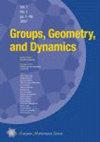自由群中的换向子长度
IF 0.8
3区 数学
Q3 MATHEMATICS
引用次数: 1
摘要
让$F$成为一个自由的群组。对于任意的$g\in\mathbb{N}$,我们提出了一个\textsc{LogSpace}(也就是多项式时间)算法来确定给定的$w\in F$是否是最多$g$个换向子的乘积;更一般地说,是一种算法,给定$w\in F$,它确定最小的$g$,使得$w$可以写成$g$换向子的乘积(如果不存在这样的$g$,则返回$\infty$)。该算法还返回$x\_1,y\_1,\dots,x\_g,y\_g$这样的单词$w=\[x\_1,y\_1]\dots\[x\_g,y\_g]$。这些算法在实践中也很有效。利用它们,我们给出了自由群中换向子长度在取平方后减小的第一个例子。这在很大程度上否定了Bardakov的猜想。本文章由计算机程序翻译,如有差异,请以英文原文为准。
On commutator length in free groups
Let $F$ be a free group. We present for arbitrary $g\in\mathbb{N}$ a \textsc{LogSpace} (and thus polynomial time) algorithm that determines whether a given $w\in F$ is a product of at most $g$ commutators; and more generally, an algorithm that determines, given $w\in F$, the minimal $g$ such that $w$ may be written as a product of $g$ commutators (and returns $\infty$ if no such $g$ exists). This algorithm also returns words $x\_1,y\_1,\dots,x\_g,y\_g$ such that $w=\[x\_1,y\_1]\dots\[x\_g,y\_g]$. These algorithms are also efficient in practice. Using them, we produce the first example of a word in the free group whose commutator length decreases under taking a square. This disproves in a very strong sense a\~conjecture by Bardakov.
求助全文
通过发布文献求助,成功后即可免费获取论文全文。
去求助
来源期刊
CiteScore
1.10
自引率
0.00%
发文量
45
审稿时长
>12 weeks
期刊介绍:
Groups, Geometry, and Dynamics is devoted to publication of research articles that focus on groups or group actions as well as articles in other areas of mathematics in which groups or group actions are used as a main tool. The journal covers all topics of modern group theory with preference given to geometric, asymptotic and combinatorial group theory, dynamics of group actions, probabilistic and analytical methods, interaction with ergodic theory and operator algebras, and other related fields.
Topics covered include:
geometric group theory;
asymptotic group theory;
combinatorial group theory;
probabilities on groups;
computational aspects and complexity;
harmonic and functional analysis on groups, free probability;
ergodic theory of group actions;
cohomology of groups and exotic cohomologies;
groups and low-dimensional topology;
group actions on trees, buildings, rooted trees.

 求助内容:
求助内容: 应助结果提醒方式:
应助结果提醒方式:


